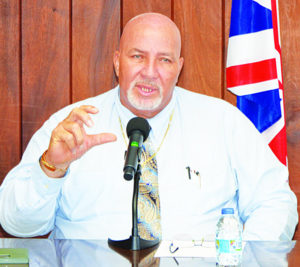
During the biweekly Government’s Press Conference of Monday, October 2nd, Independent Journalist, Elkin Richardson, asked a question of the Minister of Home Affairs with regard to the conditions required in order for the people of Anguilla to benefit from the EC$100 Million offered by the British for meeting post Hurricane Irma needs and the provision of aid during the Covid pandemic.
The question posed by Mr. Richardson follows: “Upon coming into office in 2020, we are aware of the fact that the Webster-led administration was given the opportunity to receive EC$100 Million from the British Government. One of the requirements for receiving this money had to do with the advancing of the Goods and Services Tax (GST). What other conditions were required by the British in order that this EC$100 Million could be acquired?”
The Minister was eager to answer this question, and at times during his response he became annoyed with people in the public who do not seem to understand all that was really required of the Government of Anguilla as prerequisites to receiving this package of British aid.
“I really want to answer that question,” he said. “The reason why I would like to answer your questions, Elkin, is because I have a document that spells out a whole ‘swathe’ of conditions that this administration had to undertake before that money could be received.” He indicated to the Public Relations Officer to fetch that document, and while he left to retrieve it, the Minister continued to address Mr. Richardson:
“There were several conditions, and a lot of those conditions related to things that former administrations should have done years before. So, the British used this instance to say, ‘Look! You gotta get your house in order.”
“I really want to delve into that document for you, because this issue keeps coming up in the House of Assembly, on political rostrums and ‘all over the place’. I want to say to the people of Anguilla that this administration had no choice but to implement GST. It was to come ‘come what may’.”
“And, I continue to be amazed,” he said “at the utter foolishness that is spoken so often about the stand taken by this administration to conform to the requirement of implementing the GST. We had no choice. When the former government implemented the 9% Interim Goods Tax in 2019, that was already the pre-cursor for GST. That was in 2019.”
“In 2022,” he noted, “we as an administration were able to get the implementation of the GST pushed back by eighteen months. It was supposed to come into being on January 1st, 2021. But we got it pushed back a whole eighteen months to July of 2022. This GST continues to be a talking point. The Opposition constantly talks about the people out there are hurting, but people all over the region and all over the world are hurting in one way or another. Wherever you turn, life is difficult. Even in England people are hurting, too…”
“But the thing that bothers me,” he said, “is that on the verge of the launch of the GST, when we took all those exemptions and zero-rated items to the House, none of the members of the Opposition supported the exemptions. These were measures that were designed [to make life easier for the people in the face of the GST].”
By this time the document arrived, and the Minister began to read out a raft of 16 hefty prerequisites that were to be met prior to receiving the British aid. The document was headed: “The Memorandum of Understanding Signed Between the Government of Great Britain and Northern Ireland and the Government of Anguilla”. It was signed by the previous administration on June 11th 2020, which was prior to the current administration actually taking up office.
Among the other 15 prerequisites, there was requirement #3, which related to the requirement of the implementation of GST. This read as follows: “3. Domestic Tax: Government commits to maintain progress in implementing a Goods and Service Tax (GST) including the Ministry of Finance’s preparation of, and the Permanent Secretaries of Finance’s agreement to, a White Paper and a draft Bill and regulations regarding the implementation of GST Phases 2 and 3.”
The Minister placed great emphasis on stressing Phases 2 and 3. “This means,” he said “that Phase 1 of the GST was already implemented by a 9% IGT which had gone into effect in October of 2019.”
Minister Hodge went through each of the sixteen requirements to the satisfaction of Mr. Richardson. At the end of the reading with all the explanations, Mr. Richardson requested a copy of the Memorandum for his own perusal.








